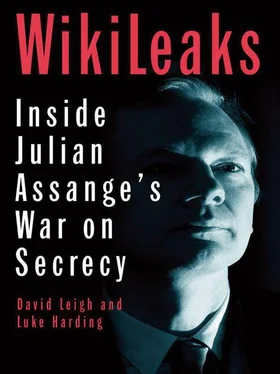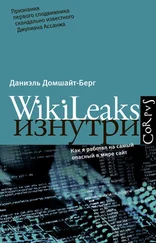Harding, Luke - WikiLeaks - Inside Julian Assange's War on Secrecy
Здесь есть возможность читать онлайн «Harding, Luke - WikiLeaks - Inside Julian Assange's War on Secrecy» весь текст электронной книги совершенно бесплатно (целиком полную версию без сокращений). В некоторых случаях можно слушать аудио, скачать через торрент в формате fb2 и присутствует краткое содержание. Жанр: Старинная литература, на английском языке. Описание произведения, (предисловие) а так же отзывы посетителей доступны на портале библиотеки ЛибКат.
- Название:WikiLeaks: Inside Julian Assange's War on Secrecy
- Автор:
- Жанр:
- Год:неизвестен
- ISBN:нет данных
- Рейтинг книги:3 / 5. Голосов: 1
-
Избранное:Добавить в избранное
- Отзывы:
-
Ваша оценка:
- 60
- 1
- 2
- 3
- 4
- 5
WikiLeaks: Inside Julian Assange's War on Secrecy: краткое содержание, описание и аннотация
Предлагаем к чтению аннотацию, описание, краткое содержание или предисловие (зависит от того, что написал сам автор книги «WikiLeaks: Inside Julian Assange's War on Secrecy»). Если вы не нашли необходимую информацию о книге — напишите в комментариях, мы постараемся отыскать её.
WikiLeaks: Inside Julian Assange's War on Secrecy — читать онлайн бесплатно полную книгу (весь текст) целиком
Ниже представлен текст книги, разбитый по страницам. Система сохранения места последней прочитанной страницы, позволяет с удобством читать онлайн бесплатно книгу «WikiLeaks: Inside Julian Assange's War on Secrecy», без необходимости каждый раз заново искать на чём Вы остановились. Поставьте закладку, и сможете в любой момент перейти на страницу, на которой закончили чтение.
Интервал:
Закладка:
Gonzalez said the disaffected Russian intelligence services officer Alexander Litvinenko secretly met Spanish security officials in May 2006, six months before he was murdered in London with radioactive polonium. Litvinenko told the Spanish that Russia’s intelligence and security services controlled the country’s organised crime network. A separate cable from Paris from December 2006 disclosed that US diplomats believed Putin was likely to have known about Litvinenko’s murder. Daniel Fried, then the most senior US diplomat in Europe, claimed it would be remarkable if Russia’s leader knew nothing about the plot given his “attention to detail”. The Russians were behaving with “increasing self-confidence to the point of arrogance”, Fried noted.
The Guardian published WikiLeaks’ Russia disclosures on 2 December 2010, over five pages and under the striking headline: “Inside Putin’s ‘mafia state’”. The front-page photo showed Putin, a former KGB foreign intelligence officer, wearing a pair of dark glasses. For many, the Russia WikiLeaks disclosures were the most vivid to emerge. Janine Gibson, the Guardian ’s website editor, was struck by the online response: “The Russia day was brilliant and hugely well read. It was the best day. We were able to say everything you might want to say, but you could never previously say because everybody is so terrified. It was an extraordinary thing.” She went on: “You can tell what the internet thinks about things. You could tell what everyone thought. There was an enormous sense of, ‘Ah-hah!’”
(Across the Atlantic, however, as though determined to cement its reputation for understatement, the New York Times published the same material under a studiedly diffident headline: “In cables, US takes a dim view of Russia”. The contrast between US and British journalistic practices could give future media studies students much to ponder.)
Undoubtedly, the cables showed the dysfunctional nature of the modern Russian state. But they also showcased the state department’s literary strengths. Among many fine writers in the US foreign service, William Burns – Washington’s ambassador to Moscow and now its top diplomat – emerged as the most gifted. Burns has a Rolls-Royce mind. His dispatches on diverse subjects such as Stalin or Solzhenitsyn are gripping, precise and nuanced, combining far-reaching analysis with historical depth. Were it not for the fact that they were supposed to be secret, his musings might have earned him a Pulitzer prize.
In one glorious dispatch Burns described how Chechnya’s ruler Ramzan Kadyrov was the star guest at a raucous Dagestani wedding and “danced clumsily with his gold-plated automatic stuck down the back of his jeans”. During the “lavish” reception Kadyrov showered dancers with $100 notes and gave the happy couple an unusual wedding present – “a five kilo lump of gold”. The ambassador was one of more than 1,000 guests invited to the wedding in Dagestan of the son of the local politician and powerful oil chief Gadzhi Makhachev.
Burns went to dinner at Gadzhi’s “enormous summer house on the balmy shores of the Caspian Sea”. The cast of guests he describes is almost worthy of Evelyn Waugh. They included a Chechen commander (later assassinated), sports and cultural celebrities, “wizened brown peasants”, a nanophysicist, “a drunken wrestler” called Vakha and a first-rank submarine captain. Some were slick, he noted, but others “Jurassic”.
“Most of the tables were set with the usual dishes plus whole roast sturgeons and sheep. But at 8pm the compound was invaded by dozens of heavily armed mujahideen for the grand entrance of the Chechen leader Ramzan Kadyrov, dressed in jeans and a T-shirt, looking shorter and less muscular than his photos, and with a somewhat cock-eyed expression on his face.” Kadyrov and his retinue sat at the tables eating and listening to “Benya the Accordion King”, Burns reported. There was a fireworks display followed by lezginka – a traditional Caucasus dance performed by two girls and three small boys. “First Gadzhi joined them and then Ramzan … Both Gadzhi and Ramzan showered the children with $100 bills; the dancers probably picked upwards of $5,000 off the cobblestones.”
This was entertaining and telling stuff, about a region – the north Caucasus – that had fallen off the world’s radar. It was reportage of the best kind.
But there were also disclosures from other troublesome areas that had long been of concern in Washington. Far from being firm, natural allies, for example, as many people had assumed, China had an astonishingly fractious relationship with North Korea. Beijing had even signalled its readiness to accept Korean reunification and was privately distancing itself from the North Korean regime, the cables showed. The Chinese were no longer willing to offer support for Kim Jong-il’s bizarre dictatorship, it seemed.
China’s emerging position was revealed in sensitive discussions between Kathleen Stephens, the US ambassador to Seoul, and South Korea’s vice foreign minister, Chun Yung-woo. Citing two high-ranking Chinese officials, Chun told the ambassador that younger-generation Chinese Communist Party leaders no longer regarded North Korea as a useful or reliable ally. Moreover, they would not risk renewed armed conflict on the peninsula, he stated. The cable read: “The two officials, Chun said, were ready to ‘face the new reality’ that the DPRK [North Korea] now had little value to China as a buffer state – a view that, since North Korea’s first nuclear test in 2006, had reportedly gained traction among senior PRC [People’s Republic of China] leaders.”
It is astonishing to hear the Chinese position described in this way. Envisaging North Korea’s collapse, the cable said, “the PRC would be comfortable with a reunified Korea controlled by Seoul and anchored to the United States in a ‘benign alliance’ – as long as Korea was not hostile towards China.” The Chinese, in short, were fed up with their troublesome North Korean neighbours. In April 2009 Pyongyang blasted a three-stage rocket over Japan and into the Pacific in an act of pure belligerence. China’s vice foreign minister He Yafei was unimpressed. He told US embassy officials that the North Koreans were behaving like a “spoiled child” to get Washington’s attention. This was all new.
The cables also disclosed, ominously for the internet future, that Google had been forced to withdraw from mainland China merely because of an unfortunate piece of bad luck. A senior member of the Communist Party used the search engine to look for his own name. He was unhappy with what he found: several articles criticising him personally. As a result Google was forced to drop a link from its Chinese-language search engine to its uncensored Google.com page and – as the cable put it – “walk away from a potential market of 400 million internet users”.
*
As far as the UK was concerned, the cables made distinctly uncomfortable reading. Educated Americans frequently regard Britain’s royal family with amused disdain, as a Ruritanian throwback. Rob Evans of the Guardian realised that, and had rapidly discovered a pen portrait which shed painful light on Prince Andrew, one of the Queen’s sons. Andrew, who was regularly flown around the world at the British taxpayers’ expense as a “special trade representative”, was the subject of an acid cable back to Washington from faraway Kyrgyzstan. He emerged as rude, blustering, guffawing about local bribery, and – to the shocked delight of reporters at the Guardian – highly offensive about their own newspaper’s exposures of corruption. The US ambassador quoted him denouncing “these (expletive) reporters, especially from the National [sic] Guardian, who poke their noses everywhere’ and (presumably) make it harder for British businessmen to do business.”
Читать дальшеИнтервал:
Закладка:
Похожие книги на «WikiLeaks: Inside Julian Assange's War on Secrecy»
Представляем Вашему вниманию похожие книги на «WikiLeaks: Inside Julian Assange's War on Secrecy» списком для выбора. Мы отобрали схожую по названию и смыслу литературу в надежде предоставить читателям больше вариантов отыскать новые, интересные, ещё непрочитанные произведения.
Обсуждение, отзывы о книге «WikiLeaks: Inside Julian Assange's War on Secrecy» и просто собственные мнения читателей. Оставьте ваши комментарии, напишите, что Вы думаете о произведении, его смысле или главных героях. Укажите что конкретно понравилось, а что нет, и почему Вы так считаете.












